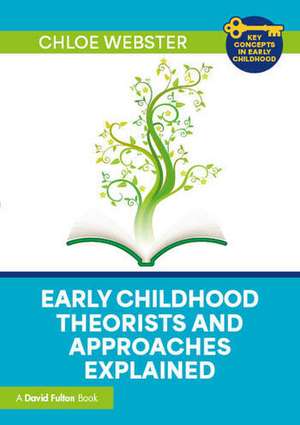Early Childhood Theorists and Approaches Explained: Key Concepts in Early Childhood
Autor Chloe Websteren Limba Engleză Paperback – 13 mar 2025
Divided into two parts, the first provides a brief overview of the theorists and approaches, both historical and modern, with explanations, backgrounds, benefits and criticisms where appropriate. It also defines key terms used in theory and research alongside examples of how they work in practice. Part two looks more broadly at how these theories and approaches have been incorporated into settings and present-day policies. The chapters also offer insights from practitioners on how the theories are used successfully and how different countries and cultures adopt and implement particular approaches.
This latest book in the Key Concepts in Early Childhood Series is essential reading for early years practitioners and students who want to support their studies and deepen their understanding, as it makes the pedagogical theories behind the early years curriculum and framework easy to understand and apply.
Preț: 174.62 lei
Nou
Puncte Express: 262
Preț estimativ în valută:
33.41€ • 34.98$ • 27.65£
33.41€ • 34.98$ • 27.65£
Carte nepublicată încă
Doresc să fiu notificat când acest titlu va fi disponibil:
Se trimite...
Preluare comenzi: 021 569.72.76
Specificații
ISBN-13: 9781032691336
ISBN-10: 1032691336
Pagini: 136
Ilustrații: 32
Dimensiuni: 148 x 210 mm
Greutate: 0.2 kg
Ediția:1
Editura: Taylor & Francis
Colecția Routledge
Seria Key Concepts in Early Childhood
Locul publicării:Oxford, United Kingdom
ISBN-10: 1032691336
Pagini: 136
Ilustrații: 32
Dimensiuni: 148 x 210 mm
Greutate: 0.2 kg
Ediția:1
Editura: Taylor & Francis
Colecția Routledge
Seria Key Concepts in Early Childhood
Locul publicării:Oxford, United Kingdom
Public țintă
Professional Practice & Development and Undergraduate CoreCuprins
Introduction
Part 1 – Explaining terms
Ainsworth
Anti-racist practice
Athey
Attachment theory
Bandura
Bavolek
Beach Schools
Belsky
Bourdieu
Bowlby
Bronfenbrenner
Bruner
Chomsky
Curiosity approach
Dewey
Dweck
Erikson
Forest Schools
Freire
Freud
Froebel
Goldschmidt
Gussin-Paley
Helicopter stories
Heuristic Play and Treasure Baskets
High/Scope
Hygge
In The Moment Planning
Issacs
Key person approach
Kohlberg
Laevers
Loving Pedagogy
Malaguzzi
Maslow
McMillan
Montessori
Parten
Pavlov
Pedagogy
Piaget
Pikler approach
Professional love
Reggio Emelia
Scaffolding
Schema Theory
Skinner
Slow Pedagogy
Steiner
Te Whāriki
Trauma-informed practice
Treasure baskets
Vygotsky
Waldorf
Winnicott
Zone of Proximal Development
Part 2 – Applying these theories to practice
The importance of embedding theories/approaches that encapsulate the beliefs of the setting as a community
How settings can begin to incorporate and follow new beliefs/ideas/approaches
Staff training
Parental involvement
Challenges of embedding new theories and approaches
Benefits of adopting/embedding new theories and approaches to early childhood education
Behavioural implications of adopting new theories and approaches
How to write a policy on pedagogy
Questions for reflection
Conclusion
Part 1 – Explaining terms
Ainsworth
Anti-racist practice
Athey
Attachment theory
Bandura
Bavolek
Beach Schools
Belsky
Bourdieu
Bowlby
Bronfenbrenner
Bruner
Chomsky
Curiosity approach
Dewey
Dweck
Erikson
Forest Schools
Freire
Freud
Froebel
Goldschmidt
Gussin-Paley
Helicopter stories
Heuristic Play and Treasure Baskets
High/Scope
Hygge
In The Moment Planning
Issacs
Key person approach
Kohlberg
Laevers
Loving Pedagogy
Malaguzzi
Maslow
McMillan
Montessori
Parten
Pavlov
Pedagogy
Piaget
Pikler approach
Professional love
Reggio Emelia
Scaffolding
Schema Theory
Skinner
Slow Pedagogy
Steiner
Te Whāriki
Trauma-informed practice
Treasure baskets
Vygotsky
Waldorf
Winnicott
Zone of Proximal Development
Part 2 – Applying these theories to practice
The importance of embedding theories/approaches that encapsulate the beliefs of the setting as a community
How settings can begin to incorporate and follow new beliefs/ideas/approaches
Staff training
Parental involvement
Challenges of embedding new theories and approaches
Benefits of adopting/embedding new theories and approaches to early childhood education
Behavioural implications of adopting new theories and approaches
How to write a policy on pedagogy
Questions for reflection
Conclusion
Notă biografică
Chloe Webster is a former practitioner and childminder with a wealth of experience in the sector.
Descriere
This new book provides accessible explanations of the key theories, concepts and approaches that form the foundations of Early Childhood Education. It is designed to be an easy and comprehensive guide to early childhood theories and approaches, an often complex topic to unpick and explore fully.


